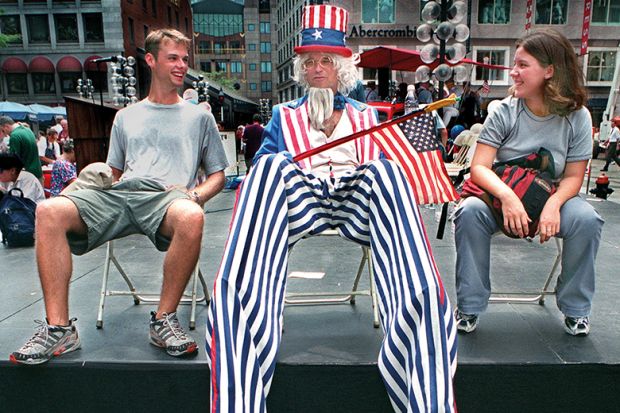When the academic year kicks off at Harvard University, professors might encounter many challenges – but adrenaline withdrawal is not typically one of them.
One of the few scholars to experience this has been political scientist Joseph Nye, who spent decades moving between academia, where he invented the concept of soft power, and government, working in the administrations of both Jimmy Carter and Bill Clinton.
Professor Nye, now an emeritus professor at Harvard, told Times Higher Education of the biggest differences between the two worlds: time and power.
“In academia, time is a secondary issue, if any at all,” he said.
“If you’re writing an article to send to a peer-review journal, you want to get it just right, even if it means publishing it next year rather than this year.
“In government, time is everything. If you’re preparing a memo for the secretary of state before he meets with a foreign ambassador at 4pm…4.30pm is an F.”
While working in the Clinton administration as assistant secretary of defence for international security affairs, Professor Nye visited 53 countries in 52 weeks, all while having to maintain a schedule in Washington.
Though he had more time, returning to academia, as dean of Harvard’s John F. Kennedy School of Government from 1995 to 2004, brought its own challenges.
“One of the problems is adrenaline withdrawal,” the former chair of the National Intelligence Council said. “When you go back to academia, I found that my first reaction was a sense of relief at the relaxation and then, after a couple of weeks, I felt that meetings on new grading practices for such and such a course weren’t all that interesting.
“After a while you start to miss the excitement of what you were doing before.”
However, Professor Nye acknowledged that academia – particularly the opportunity to argue with intelligent graduate students – gave him the chance to understand his own ideas better, compared with the relentless schedule of government.
“There’s no time in government to think about the ethics,” he said. “You’re drinking from a fire hose with people flooding you with information and visits and testimony and travel.”
Alongside soft power, Professor Nye is also credited with co-founding the theory of neoliberalism, though this is a label he regards as over-simplified.
Academics can have an influence on policy from outside the Washington bubble, according to Professor Nye, including indirectly through their students or directly through the “trickle-down” effect of something they have written.
In his new book, A Life in the American Century, he writes that launching policy ideas from outside government is like “dropping pennies into a deep well”.
One way to influence things from outside is by working as a public intellectual – writing opinion pieces for newspapers, appearing as a pundit on television or, in more recent times, by using social media to advance an idea without the need for peer review.
But as Professor Nye found when trying to oppose the invasion of Iraq, it can be a frustrating task to keep dropping pennies.
“When you’re trying to influence things as a public intellectual, sometimes you hear a splash, but sometimes you’re just kidding yourself,” he said.
He concluded that the most significant way to affect policy was by being in government and to “have your hands on the levers” – but even then, he said, that was drawing upon academic capital that has been stored up.
“I find the transfer back and forth between government and academia is fruitful in both directions,” he added.
When Professor Nye worked for President Carter, he was in charge of nuclear non-proliferation policy and his title meant that people within government wanted to be at his meetings.
This was partly because of the “academic capital” he had built up throughout his career, but partly because they were attracted and incentivised to be there.
“I found a lot of getting things done depended on attraction. This eventually led me to coin the term ‘soft power’, the ability to get what you want through attraction, rather than coercion or payment,” he said.
Professor Nye said he had been intrigued to watch how that theory of soft power, an analytical concept he outlined while working at his kitchen table in 1989, became popularised and twisted in the outside world as it spread.
Many commentators treated the concept as any form of power that was not military might, but this was a careless interpretation, according to Professor Nye.
“The metaphor I use is that when your children are young or your ideas are new you can discipline them, but as they grow up you really can’t control them or the company they keep.
“It is a strange thing. If you google ‘soft power’ there are millions of entries; I’ve never tried to evaluate how many use it accurately or inaccurately. Most of the time there’s not much you can do about it.”
Register to continue
Why register?
- Registration is free and only takes a moment
- Once registered, you can read 3 articles a month
- Sign up for our newsletter
Subscribe
Or subscribe for unlimited access to:
- Unlimited access to news, views, insights & reviews
- Digital editions
- Digital access to THE’s university and college rankings analysis
Already registered or a current subscriber? Login







